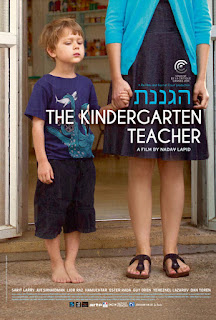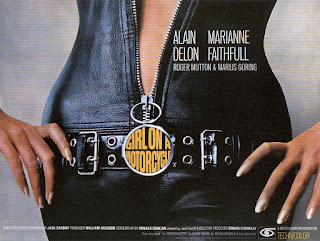WEDDING PRESENTS
on POLICEMAN, THE KINDERGARTEN TEACHER, CRUEL STORY OF YOUTH and THE GIRL ON THE MOTORCYCLE
It’s
nice to stand back every now and then from the madness that is the
weekly release schedule. Also because it’s good to revisit stuff
you’ve seen a while ago – you’d be surprised at what best
survives the test of time, or how something that you found throwaway
or weren’t particularly enthusiastic about turns into a time
capsule or benefits from the gift of hindsight.
Some
films only seem to gain stature with time – like Nadav Lapid’s
2011 Policeman,
which
I caught in advance of the Israeli director’s retro at the Vila do
Conde short film festival (whose competition he won two years ago
with his wry 40-minute From
the Diary of a Wedding Photographer).
Policeman,
his first feature, is a game of two halves. First, we follow a couple
of days in the life of a SWAT officer in the Israeli
counter-terrorism police; then, Lapid switches to follow a couple of
days in the life of a radicalized angry young woman, part of a group
of college-age youngsters planning the kidnapping of three
millionaires to protest social inequality in modern Israel.
On
one hand, a silent hyper-macho culture of patriarchal violence sworn
to protect the status
quo;
on the other, a high-minded talkative rebellion against that same
status
quo. The
ironies are constantly visible throughout, and the personal is always
political: the cops don’t make enough money, yet are sworn to
protect those who have all the money and look down on everyone else;
society couldn’t care less about moral stands, and there’s a
whiff of hypocrisy in seeing well-meaning bourgeois kids playing at
being revolutionaries (“revolution is not poetry, it’s prose”
says someone at some point); everything is neatly labeled – cops
are heroes, terrorists are scum, millionaires are above the law,
nobody is really listening to anybody else.
Violence
seems to be the only common language all the characters share in a
society profoundly corrupted by money. Lapid may be talking of his
native country, but his film, shot
in a distant, neutral, quasi-procedural
style,
steers
clear of the Israeli-Palestinian issue and prefers to look within the
fabric of Israeli society, sketching a sense of injustice,
polarization, random chaos that turns
out to be pretty
universal and reflect a lot of what’s going on in our own days (not
only in Israel).
Policeman
articulates questions rather than answer them; though made in 2011,
it talks spookily to 2018 in ways that have gotten more visible with
time.
If
Policeman
is uncomfortable, Lapid’s follow-up, 2014’s The
Kindergarten Teacher,
multiplies that by a factor of ten. I can’t say many films have
made me squirm as much in my chair - I felt like I didn’t really
want to be seeing it. This is actually a really good thing: like
Policeman,
The
Kindergarten Teacher
works by upending your expectations of where the film is taking you,
and by making you understand its characters (and by extension all of
Lapid’s characters) are not strange people, outliers, rather
productive
members of society. Nira, the title character, is married happily,
has two grown children, is taking a poetry workshop in her spare
time. But the extent to which something is missing in her apparently
orderly life will only be revealed as she becomes obsessed with one
of her kindergarten wards: Yoav, a young boy of six who will, every
now and then, spit out a perfectly composed, extraordinarily adult
poem, as if in a trance. (Lapid
shoots most of the kid’s scenes with a mobile camera that suggests
the automatic-writing aspect of his creations.)
In
a society where art and poetry are thought of as dilettante pursuits
and where everything is geared towards utilitarianism, survival,
money,
Nira feels it is her duty to protect this delicate, surprising talent
from the assaults of the world – going to extremes that turn out to
be worrisome, if not openly deranged. But Nira does have a point,
even if she belabors and stretches it to breaking point, and Lapid
wants us to
empathize
with a lonely woman who
has
more to give than what
society
is interested in from her.
That’s
why the way she careens into a sort of madness is so well structured
by the director and by his actress, Sarit Larry, becomes so
profoundly uncomfortable to the viewer: it’s as if Nira becomes a
sacrificial victim to the very world she wants to protect the little
poet from, since she’s ultimately the only one who truly cares. But
what is she caring for? Poetry, the
young boy, herself,
her convictions?
The
Kindergarten Teacher
suggests that this sort of self-imposed obsessive slide into
derangement is present in all of us – after all, everyone else in
this film is self-absorbed, only in different ways. It’s not the
individual that is the problem.
In
that, Lapid’s features connect with the late Japanese provocateur
Nagisa Oshima’s second feature, 1960’s Cruel
Story of Youth,
a cautionary tale of young people in love facing a post-war society
that expects them to conform to a box they don’t want to fit in.
Makoto and Shinjio are playing with fire, mostly out of despair and
energy, and the petty larcenies they engage in to survive prey on the
hypocrisies of a Japanese society that hides everything behind a
veneer of decorum. But when you’re in your early twenties decorum
is the last thing in your mind – cynicism, cruelty, nihilism,
naïveté, wanting
everything now,
all
of this is blown
around in our angry young people’s misadventures. Hence
the film’s sumptuous melting-pot of visual shoutouts to the
American rebels-without-a-cause youth melodramas, all strong colours,
widescreen framing and brisk editing.
Yet
there is also a surprising, mysteriously contemporary connection to
the rebellious filmmaking being made in Europe at the time - the
British kitchen sink dramas with their social issues, the stylistic
freedom of French Nouvelle Vague – and an omen
of
the New Hollywood that was still a few years away (I swear I thought
of Malick’s Badlands).
It’s all about standing up for a new approach to storytelling that
takes into account the societal changes taking place.
Still, it’s
important to point out that, even though Cruel
Story of Youth is
formally daring within its context, its narrative construction
remains very much within the constraints of a classic melodrama –
as the story progresses and its plotlines start criss-crossing,
there’s a sense this could almost be Sirkian in its tragic
undertones. But that was part of the appeal of using the same
building blocks to create something entirely new.
At
the other end of sixties anomie you find the curio that is Jack
Cardiff’s hipster-existentialist The
Girl on the Motorcycle.
Shot at the height of the swinging sixties, it features Marianne
Faithfull at the height of her it-girlness as Rebecca, a bored
housewife who races
from
her home to meet her lover. “Races”
should be taken literally:
the film follows her road trip to Germany astride the glorious
Harley-Davidson that her lover, a sly
philosophy
teacher, gave her as a wedding present.
Adapted
from a 1963 novel by surrealist writer André Pieyre de Mandiargues,
The
Girl on the Motorcycle has
long gone down in history as one of those follies possible only in
the permissiveness of the sixties, made by middle-aged men trying to
catch the young
spirit
of the times. The
stilted construction of its narrative, interspersing Rebecca’s
journey with remembrances in flashback of her love affair, narrated
in her own voiceover, are
scored
by British
MOR
icon Les Reed and shot in wannabe psychedelic flourishes by
Cardiff,
53 at the time of the shoot and
the
ace British DP of Powell & Pressburger’s A
Matter of Life and Death
and The
Red Shoes,
Mankiewicz’s The
Barefoot Contessa or
Huston’s African
Queen.
Seen
today, inside
the
incoherent artsiness of the project lies a truly tantalizing, if
inachieved, meditation on the free will of a modern woman. Like
Nira in The
Kindergarten Teacher or
Makoto in Cruel
Story of Youth, Rebecca
is not content with playing the part of the prim household fairy, she
wants more out of life. It’s disturbing in these days of #MeToo
that, at one point, Rebecca describes herself as “an adulterous
teenage bride… born too soon, a randy bitch permanently in heat”,
as if eroticism and the pleasures of transgressive
sex
would be the only escape routes
available to her.
But
the consideration of a woman’s role in a patriarchal society is all
but undone by the fact that, ultimately, The
Girl on the Motorcycle collapses
into exploitative, peek-a-boo erotica with a hypocritically
cautionary
ending,
saved only by the contradictory perfection of the casting. Faithfull
may have been unable to give her lines any depth, but she looks
positively radiant in full leather as she practically rides her way
into a massive orgasm, mere putty in the hands of the predatorial
Alain Delon, who gets
first billing but is pretty much a supporting role as the
lover with an almost off-handed animal presence. He is the man who
has it all and takes it gladly; she is the woman who gives all of
herself to him. As
far away from the kitchen sink realism of the late fifties, this was
one case of sexual liberation gone awry – yet what might have lain
in store here!





Comments